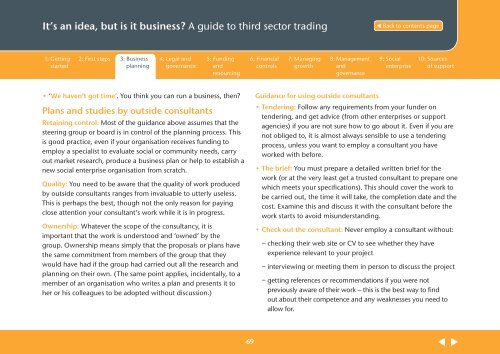A guide to third sector trading - WCVA
A guide to third sector trading - WCVA
A guide to third sector trading - WCVA
You also want an ePaper? Increase the reach of your titles
YUMPU automatically turns print PDFs into web optimized ePapers that Google loves.
It’s an idea, but is it business? A <strong>guide</strong> <strong>to</strong> <strong>third</strong> sec<strong>to</strong>r <strong>trading</strong><br />
1: Getting<br />
started<br />
2: First steps 3: Business<br />
planning<br />
4: Legal and<br />
governance<br />
5: Funding<br />
and<br />
resourcing<br />
6: Financial<br />
controls<br />
7: Managing<br />
growth<br />
8: Management<br />
and<br />
governance<br />
9: Social<br />
enterprise<br />
10: Sources<br />
of support<br />
• ‘We haven’t got time’. You think you can run a business, then?<br />
Plans and studies by outside consultants<br />
Retaining control: Most of the guidance above assumes that the<br />
steering group or board is in control of the planning process. This<br />
is good practice, even if your organisation receives funding <strong>to</strong><br />
employ a specialist <strong>to</strong> evaluate social or community needs, carry<br />
out market research, produce a business plan or help <strong>to</strong> establish a<br />
new social enterprise organisation from scratch.<br />
Quality: You need <strong>to</strong> be aware that the quality of work produced<br />
by outside consultants ranges from invaluable <strong>to</strong> utterly useless.<br />
This is perhaps the best, though not the only reason for paying<br />
close attention your consultant’s work while it is in progress.<br />
Ownership: Whatever the scope of the consultancy, it is<br />
important that the work is unders<strong>to</strong>od and ‘owned’ by the<br />
group. Ownership means simply that the proposals or plans have<br />
the same commitment from members of the group that they<br />
would have had if the group had carried out all the research and<br />
planning on their own. (The same point applies, incidentally, <strong>to</strong> a<br />
member of an organisation who writes a plan and presents it <strong>to</strong><br />
her or his colleagues <strong>to</strong> be adopted without discussion.)<br />
Guidance for using outside consultants<br />
• Tendering: Follow any requirements from your funder on<br />
tendering, and get advice (from other enterprises or support<br />
agencies) if you are not sure how <strong>to</strong> go about it. Even if you are<br />
not obliged <strong>to</strong>, it is almost always sensible <strong>to</strong> use a tendering<br />
process, unless you want <strong>to</strong> employ a consultant you have<br />
worked with before.<br />
• The brief: You must prepare a detailed written brief for the<br />
work (or at the very least get a trusted consultant <strong>to</strong> prepare one<br />
which meets your specifications). This should cover the work <strong>to</strong><br />
be carried out, the time it will take, the completion date and the<br />
cost. Examine this and discuss it with the consultant before the<br />
work starts <strong>to</strong> avoid misunderstanding.<br />
• Check out the consultant: Never employ a consultant without:<br />
− checking their web site or CV <strong>to</strong> see whether they have<br />
experience relevant <strong>to</strong> your project<br />
− interviewing or meeting them in person <strong>to</strong> discuss the project<br />
− getting references or recommendations if you were not<br />
previously aware of their work – this is the best way <strong>to</strong> find<br />
out about their competence and any weaknesses you need <strong>to</strong><br />
allow for.<br />
69












